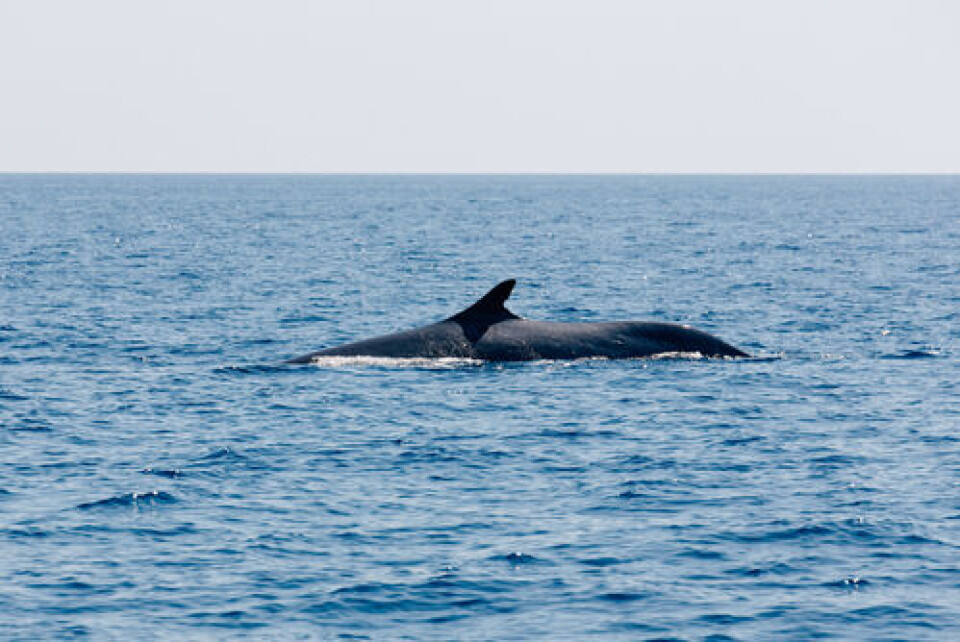-
Warnings issued over connecting to public WiFi networks in France
Lack of encryption and risk of connecting to ‘fake networks’ leave users at risk of hacking attempts
-
France impacted by EU approval for €3 tax on small parcels from outside the union
Tax could coincide with separate French fees for parcels says Finance Ministry
-
Winegrowers outraged by €0.01 bottle of wine in French supermarket
Lidl claims labelling error but local farmers’ union says it threatens local production
Is it normal that whales are being beached along Brittany coastline?
A whale which had been rescued from a beach last week has now been found dead. It is the third this month to have met this fate

It has been confirmed that a finback whale found dead on Tristan Island off Brittany is the beached whale which was rescued in the region last week.
This is the third time a whale has been found dead on a Finistère beach this month, causing wildlife experts to ask why these incidents are occurring.
The young, 12-metre-long whale had been able to return to the sea after becoming beached at Ploéven on September 19, thanks to the efforts of volunteers including members of Sea Shepherd France.
The NGO named the animal Kalon, which is Breton for ‘heart’ or ‘courage’.
— Sea Shepherd France (@SeaShepherdFran) September 26, 2022
Read more: ‘Miraculous’: Whale beached in Brittany regains the sea
After regaining the sea, the exhausted, disoriented whale had remained in shallow water around the Baie de Douarnenez for several hours, causing concern among volunteers.
The body of a dead whale washed up on Tristan Island on September 27, and Sea Shepherd used a pattern of scars on its skin to identify it.
— Sea Shepherd France (@SeaShepherdFran) September 28, 2022
“I have been to see it. I can confirm that the dead finback whale is Kalon,” Sea Shepherd president Lamya Essemlali said.
Nous nous sommes déplacés auprès du cadavre. La comparaison des cicatrices laisse peu de doutes sur le fait qu’il s’agit bien de Kalon
— Sea Shepherd France (@SeaShepherdFran) September 27, 2022
RIP cœur vaillant 🖤
Why are whales becoming beached?
Kalon is the third whale to have been found dead on a Finistère beach this month. Another cetacean was discovered on the Île de Sein on September 2, and a second was found on the Plage de Kermabec on September 10.
This 16-metre-long creature was very thin but the cause of its death could not be determined.
Sea Shepherd has pointed out that whales are very sensitive to ultrasound, and that the beached whales all washed up near the Île Longue submarine base.
“We suspect that sonar tests may have weakened the cetaceans,” a member of the Sea Shepherd team has said.
However, the maritime prefecture has said that there were no military ships, submarines or buildings using sonar at the time that the whales became beached.
Me Essemlali has also suggested that: “The fact that their food is becoming harder to come by may lead these huge mammals to hunt in different areas.”
She added that this may be due to overfishing around Brittany.
This idea was supported by Cécile Gicquel, who is in charge of the natural heritage of the Iroise Natural Marine Park.
François Sarano, director of an organisation called Longitude 181, has previously said that whales “send out a ‘tac’ sound and listen for the echo in order to orient themselves and find their prey. But when, suddenly, ship traffic is very dense, sounds from the surroundings mean that they find it harder and harder to position themselves.”
‘Not a new phenomenon’
Olivier Van Canneyt, who is a researcher at the Observatoire Pelagis, told Huffington Post that beached whales “are not a new phenomenon,” adding that in 2019, six finback whales were found on Brittany beaches over two months.
“These peaks in deaths are not worrying when put in the context of the known size of the finback whale population,” which is several tens of thousands strong.
When several beachings occur over a short period, a rise in population numbers has generally been observed in the preceding months.
This was the case this year, when “our boat observations enabled us to see more finback whales than usual in the waters.
“For the moment, the phenomenon does not surpass what we have seen in the past.
“However, it is calling for our attention because we have not yet identified the cause of these deaths.”
Another hypothesis that has been suggested is that the dead whales had consumed toxic algae.
“Autopsies have not suggested particular trauma related to collisions with boats or getting trapped in fishing equipment,” Mr Van Canneyt said.
“Human maritime activity is known to be a cause of the death of certain species like dolphins, but for the moment it has never been linked to baleen whales.”
Mr Van Canneyt added that although the number of deaths is not necessarily concerning, the increasing frequency of the incidents, which have occurred in 2019, 2020 and 2022.
“These spikes in mortality rates are becoming more common and close together, so we are wondering whether there is a link to the acceleration of climate change.”
Related articles
Beluga whale in Seine dies during rescue operation
€10,000 reward for help in finding person who shot Seine orca
Skeleton of orca that died in the Seine to enter Paris museum
























